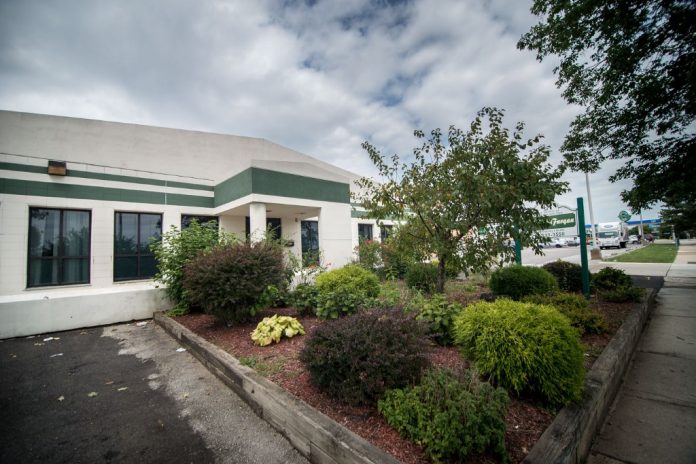Zoning matters: The city’s Zoning Board has allowed the Islamic Society of Greater Philadelphia’s building on Roosevelt Boulevard to expand and build a 65-foot minaret. MARIA POUCHNIKOVA / TIMES PHOTO
A man who lives near a Northeast Philadelphia mosque is appealing a zoning board decision to allow the mosque to expand and build a 65-foot minaret.
Larry Genetti, who lives in the neighborhood behind the Islamic Society of Greater Philadelphia’s building on the 7200 block of the Boulevard, feels the city’s Zoning Board of adjustment erred when it decided to allow erection of a one-story addition, including a dome and minaret and legalization of a canopy to the one-story building that once was a union hall.
Parking is one of the biggest issues, Genetti said last week. The property doesn’t have 20 spaces so those attending services illegally park. Besides that, he said, the property isn’t zoned for a religious institution.
The city’s online property records show the Islamic society bought 7252 Roosevelt Blvd. in 2007 for $1,250,000. Current records show the property has commercial zoning, but list it as a one-story house of worship. A zoning variance is needed for the expansion, especially for the minaret, which will be almost 30 feet higher than city code allows for the area.
In oral arguments before Common Pleas Court Judge Nina Wright Padilla on Sept. 17, Genetti’s attorney, John Sabatina Sr., said the zoning board abused its discretion when it decided to allow the mosque’s expansion. The matter had been in court already, and Sabatina maintained the ZBA did not comply with an earlier court order on considering the society’s variance application. The applicant, Sabatina said, had to prove there was a hardship if the requested use were not allowed.
In zoning matters, “hardship” means a property can not be used any other way than how a variance applicant wants to use it.
Attorney Nino Tinari, who represented the Islamic society, said 7252 Roosevelt Blvd. can not be converted to a permitted use. Sabatina countered that there is no evidence of hardship. He said the hardship is self-imposed by the applicant’s effort to exploit an existing “over-use” of the property.
Sabatina said those who attend services at the mosque crowd local commercial parking lots without permission and park on sidewalks. He also said services are conducted in the society’s parking lot. He said he had a letter from the police department that described the continuous illegal parking in the area.
Tinari said his client had an agreement with the manager of a local department store that would allow parking in his lot, but Sabatina said there is no record of such a pact. Tinari countered that there is no record that there isn’t. The judge didn’t render a decision on the appeal and didn’t say when she would.
Genetti said he had allowed his name to be on the appeal, but it was filed on behalf of many neighbors. “The entire community is responsible for the appeal,” he said. ••





